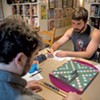Published October 12, 2005 at 2:08 p.m.
Bob Volk is a lucky man. The 42-year-old Waltham resident is living a Gen-Xer dream: He has his own video games. No, not like Xbox and PlayStation 2, though he's got both of those consoles kicking around somewhere for his kids. I'm talking about vintage video games and pinball machines -- the kind I used to see in the arcade and fantasize about owning.
Volk, a laid-back, muscular guy, has 50 of them. He's got Pac Man, Dig Dug, Centipede and Tron. He's got Moon Patrol, and Spy Hunter, Phoenix and Gorf. And he's got a whole wall of pinball machines -- from the Addams Family to the Simpsons -- in the airy, high-ceilinged, second-floor living room of his custom-built log home. Most of the video machines are in a room on the first floor. The door bears a painted wooden sign that reads, aptly, "Arcade."
This probably doesn't seem like a big deal to anybody old enough to remember the Kennedy assassination, or young enough not to remember the first Challenger explosion, but to those of us who came of age in the 1980s, Volk's collection is remarkable. These games are relics from a bygone era, and as anyone who tries to find them in arcades knows, they're disappearing -- even though people like me, and Volk, are still eager to play them.
Not that video games like these were necessarily easy to find when we were younger. Sure, some of us had Atari or Collecovision or Commodore 64 hooked up to our TVs, but whatever we had paled in comparison to what could be found at the arcade. Those machines always had better graphics, better controllers and better background music. It was unheard of to have one at home. Only really wealthy or well-connected people owned video game machines. Or at least that's what I thought growing up.
Volk confirms that perception. The New Jersey native is a roofer who specializes in slate. In 1982, he saw a Mr. Do! game at a client's house in New Jersey and was shocked. "People didn't just have arcade games in their living rooms back then," he remembers. He found out that his client's brother was a vending distributor in New York. Volk worked out a deal to trade the roofing job for his first video game -- Taito's Elevator Action.
He's been collecting games ever since. He used to scan the classifieds in trade magazines in the mid-'80s. He once picked up several in good condition for just $50 each; today, some of them are worth thousands. At one point, Volk had 300 games.
In the early years, before they finished their house in 1994, Volk and his wife Carol had to stash the machines in her parents' basement and in a warehouse space he rented. "Room was definitely a problem," he says.
And space wasn't the only issue. From a couch in front of a big-screen TV, positioned beneath a neon "Voodoo Lounge" sign, Carol chimes in, "It's horrible to move these things."
Volk has downsized since then, apparently at his wife's request. The couple opened an arcade in Vergennes for a year in the 1990s, and vended games in Burlington-area movie theaters from 1999 to 2003. But these days Volk's collection is limited to what he's got on display and in his garage. Last month, this impressive array of nostalgia inspired a cover story in GameRoom magazine, a national collectors' publication.
Volk's spread includes more than just the games themselves -- he's also got scads of original game marquees, which he displays on the wall behind the pinball machines. It's thrilling to see signs for Joust and Zaxxon. And a small, hand-held electronic game sits atop each of the pinball machines. Volk's even got a DVD collection of 30 episodes of "Starcade," a TV game show about video games. "I would pay dearly to have all the episodes," he says. "Apparently the rights are sealed."
*****
The part of the treasure trove that interests me most is downstairs, in Volk's retro arcade. The low ceiling is fitted with black lights that bring out the carpet's pattern of confetti and streamers. Walking into the room, I accidentally kick a fat bucket of tokens, plopped on the floor like a pot of gold. The games themselves are packed side by side, exactly as they would have been in the game parlors of my youth. When Volk turns on a few of them, their sound effects compete with each other in a soothing, familiar cacophony.
The collector says he built this arcade because game parlors were important to him when he was a teenager. A preacher's son, he never got into trouble or used drugs, and he longed for a place where he could goof off. He found arcades at "the perfect time," he says. "I needed it badly." Having the games at home brings back those memories and allows him to relax by "escaping into another world" for a few minutes.
Volk points out one of his favorites -- Ghosts and Goblins, from 1986. "I used to think it had awesome graphics," he says. We both know that comparing this to today's games is like comparing a tiny, fuzzy, black-and-white TV with 13 channels to a giant, flat-screen plasma set with 1300.
I remember this game and ask him if we can play. The premise is that you're a knight and you're trying to get past these ghouls. In the first level, they pop out of the ground in a graveyard. You shoot swords at them. When you hit them, they explode in a blotch of blood.
I get past the first couple of goblins, then one runs into me, and my armor disappears. My little bearded knight is suddenly running along in his tighty-whiteys. Then I get hit again and turn into a pile of bones. Darn.
Volk zips right through that first level. He plays this game more often than most of the others. He doesn't have much time to spend down here; he plays some of these machines only a couple times a year.
In the second level, screaming banshees fly at Volk's knight. "I hate these things," he mutters as he shoots at them. He leans his whole body into the machine, and pokes the fire button as fast as he can. Eventually, I let him take my turns. I suck at this game, plus it's much more fun to watch him play.
But the tables are turned when I challenge him to Centipede. This was my game. Manufactured by Atari, Centipede appeared in 1980 and became wildly popular. It was also the first to be designed by a woman, according to the Killer List of Video Games at www.klov.com. Instead of a joystick, it features a track ball that you roll to control your gun, which roves within the bottom fifth of the screen. On each level, a centipede descends from the top. You have to shoot it, and avoid the spiders, fleas and scorpions that try to run into you. The game has a distinctive background soundtrack -- an incessant bass beat that sounds like the pounding of tiny feet.
I didn't learn to play Centipede in an arcade; I practiced in a bar, when I was just 6. My dad's friend Ronny had Centipede at his establishment in Detroit. I used to bum quarters from the guys on the bar stools, who liked to watch me play. During the summer, I played video games with my older cousin Jimmy, and Centipede was the only game I ever won.
Things have changed since then. Ronny's bar is gone, and Jimmy died in a car crash in 1993. But I still love Centipede. I don't get to play very often, but when I find a machine, I can sit in front of it for an hour.
The game Volk and I play is close. He goes first and racks up 8000 points on his first guy. I stumble on my first couple turns -- I try to get near the spider that drops down on you, because you get more points at close range. But he wipes me out twice before I can score much. Luckily, Volk has the same trouble later in the game. Eventually, I win, 36,548 to 33,138.
"Great job!" says Volk. "You beat the arcade operator." He says he'll practice for next time. I'd say that, too, but I have nowhere to practice. Volk says arcade owners rarely carry vintage games, because they cost a lot to fix and won't earn enough to pay back the investment. He notes that you can still find some of the older machines at Fun Spot, near Lake Winnipesaukee in New Hampshire.
Nowadays, Volk laments, arcades are full of redemption machines that give tickets and boring, first-person- shooter knock-offs. The game parlors of the '80s, with their simple but original machines, are pretty much gone. "It's all faded away," he says, standing amidst the flickering screens of his private collection. "It's sad."
More By This Author
Speaking of...
-

Williston Tech Company Polly Lays Off 17 People in Vermont
Dec 5, 2022 -

Report: Investment in Vermont Companies Soared Nearly 500 Percent Last Year
Apr 5, 2022 -

Video: Musicians Jeremiah and Annemieke McLane Move into their New Home
Mar 24, 2022 -

Tech Biz Resonant Link Raises $9 Million, Plans to Double Staff
Feb 9, 2022 -

Creating Art That Celebrates the Culture and Climate of Places Around the Globe
Jun 29, 2021 - More »
Comments
Comments are closed.
From 2014-2020, Seven Days allowed readers to comment on all stories posted on our website. While we've appreciated the suggestions and insights, right now Seven Days is prioritizing our core mission — producing high-quality, responsible local journalism — over moderating online debates between readers.
To criticize, correct or praise our reporting, please send us a letter to the editor or send us a tip. We’ll check it out and report the results.
Online comments may return when we have better tech tools for managing them. Thanks for reading.















































